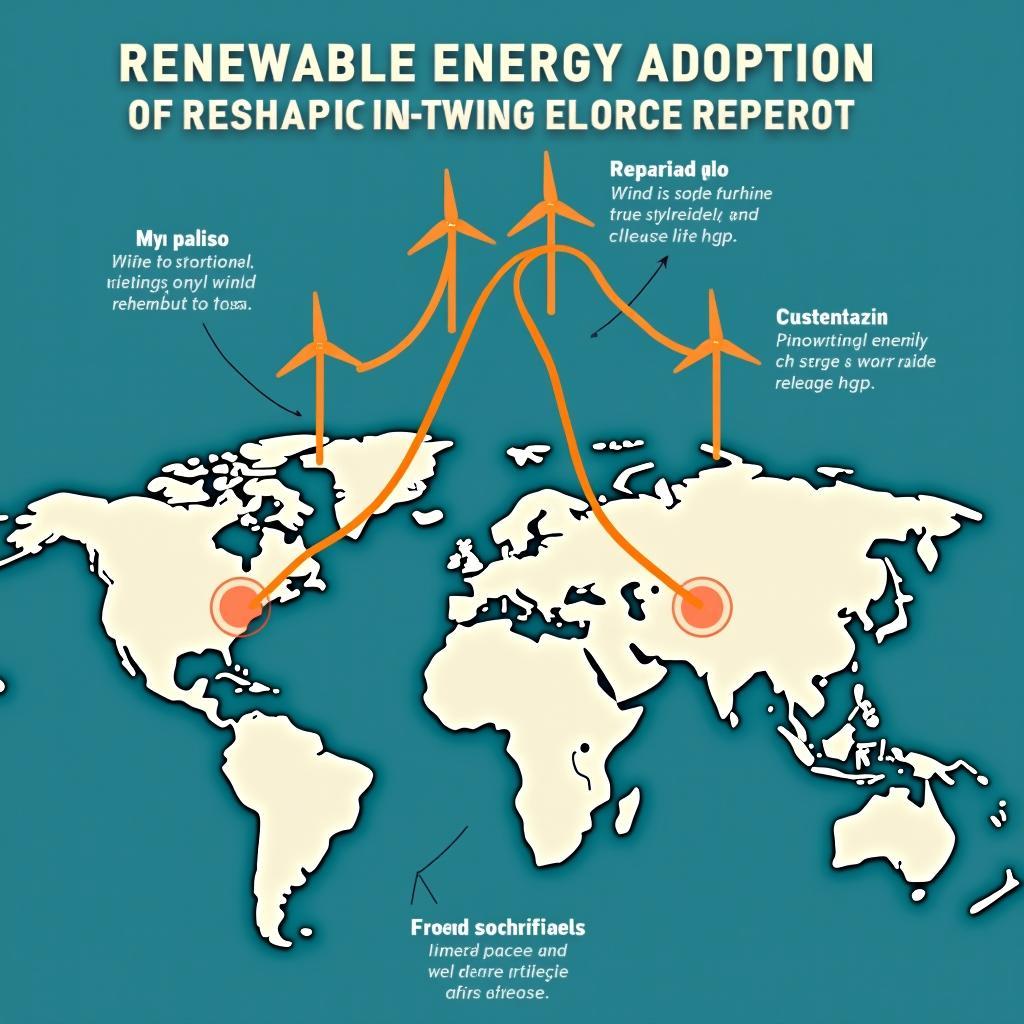The topic of renewable energy and its geopolitical implications has become increasingly prevalent in IELTS Writing Task 2 examinations. Based on analysis of past papers, this theme appears in approximately 15% of all environment and technology-related questions, with a rising trend observed since 2019.
 Renewable Energy Transforming Global Power Dynamics and International Relations
Renewable Energy Transforming Global Power Dynamics and International Relations
Analysis of Task Question
Some people believe that the transition to renewable energy will reduce international conflicts over energy resources. Others argue it could create new forms of competition between nations. Discuss both views and give your opinion.
This question requires candidates to:
- Examine both perspectives on renewable energy’s impact on global relations
- Provide relevant examples and evidence
- Present a clear personal stance
- Follow a balanced approach in argument presentation
Band 9 Sample Essay
The global shift towards renewable energy is fundamentally reshaping international power dynamics, with differing views on whether this transition will mitigate or exacerbate geopolitical tensions. While some argue that renewable energy will reduce resource-based conflicts, others contend it may spark new forms of competition. In my opinion, while renewable energy will eliminate certain traditional causes of conflict, it will likely introduce new challenges in international relations.
Proponents of renewable energy’s peace-promoting potential make several compelling arguments. Firstly, the decentralized nature of renewable resources like solar and wind power means that nations can achieve greater energy independence, reducing their reliance on fossil fuel-producing countries. This diminished dependency could decrease the likelihood of energy-related conflicts, as seen historically in oil-rich regions. Moreover, renewable energy’s unlimited and widely available nature means countries need not compete for finite resources, potentially fostering more cooperative international relationships.
However, critics raise valid concerns about new forms of competition emerging. The manufacturing of renewable energy technologies requires rare earth elements and specific minerals, potentially creating new resource battlegrounds. China’s current dominance in solar panel production and rare earth processing demonstrates how renewable energy can create new forms of economic and political leverage. Additionally, technological advantages in renewable energy development could become a source of international tension, as nations compete for intellectual property rights and market dominance.
In my assessment, while renewable energy will transform rather than eliminate international competition, its net effect will be positive for global stability. The distributed nature of renewable resources and the potential for technological cooperation could foster more collaborative international relationships than the zero-sum game of fossil fuel politics. However, careful international governance frameworks will be essential to manage new forms of competition and ensure equitable access to renewable technologies.
Band 7 Sample Essay
The transition to renewable energy is changing how countries interact with each other regarding energy resources. This essay will discuss whether this change reduces conflicts or creates new competitions between nations.
Many people believe renewable energy will help reduce international conflicts. When countries can produce their own solar and wind power, they don’t need to depend on other countries for energy. For example, European countries are investing in renewable energy to reduce their dependence on Russian gas. Also, since sunlight and wind are available everywhere, countries don’t need to fight over these resources like they do for oil.
However, renewable energy might create different kinds of competition. Countries need special materials to make solar panels and wind turbines. Some nations might try to control these materials. For instance, China produces most of the world’s solar panels, which gives them power over other countries. Also, countries compete to develop better renewable technology first.
In my opinion, renewable energy will probably create both positive and negative effects on international relations. While it helps countries become more independent, new challenges will arise. The key is for countries to work together to manage these challenges fairly.
Band 6 Sample Essay
Renewable energy is becoming more important in the world. Some people think it will reduce fights between countries, but others think it will make new problems.
When countries use renewable energy, they don’t need to buy oil from other countries. This is good because countries won’t fight about oil anymore. For example, many countries are trying to use more solar power now. Also, every country can get sun and wind for free.
But there are also problems with renewable energy. Some countries are better at making solar panels than others. This can cause new problems between countries. Also, countries want to be the best at new technology.
I think renewable energy is good for the world. Even though there might be some new problems, it is better than fighting over oil. Countries should try to work together on renewable energy.
Key Vocabulary
- Geopolitical (adj) /ˌdʒiːəʊpəˈlɪtɪkl/ – relating to politics affected by geographical factors
- Decentralized (adj) /diːˈsentrəlaɪzd/ – distributed or dispersed away from a central location
- Mitigation (n) /ˌmɪtɪˈɡeɪʃn/ – the action of reducing the severity of something
- Rare earth elements (n) /reər ɜːθ ˈelɪmənts/ – a set of 17 chemical elements in the periodic table
- Zero-sum game (n) /ˈzɪərəʊ sʌm ɡeɪm/ – situation where one person’s gain is equivalent to another’s loss
Conclusion
This topic will likely remain relevant in future IELTS examinations. Practice writing about related themes such as:
- Technology transfer in renewable energy
- Environmental cooperation between nations
- Economic impacts of energy transition
- Innovation and competition in clean technology
Share your practice essays in the comments for feedback and improvement suggestions.


